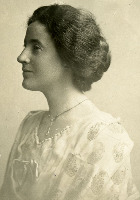Enid Derham Biography
Enid Derham was an Australian poet and academic.
Life
Derham was born in Hawthorn, Melbourne, Victoria, the eldest daughter of Thomas Plumley Derham, solicitor, and his wife Ellen Hyde, née Hodgson, of Melbourne. Derham was educated at Hessle College, Camberwell, then at Presbyterian Ladies' College and the University of Melbourne. She graduated M.A. with final honours in classics in 1903, and subsequently studied at Oxford University.
Derham lectured in English at the University of Western Australia in 1921 and was appointed senior lecturer in English at the University of Melbourne in 1922, and held this position for the rest of her life. She died suddenly of a brain haemorrhage at her home in 1941.
Writing
In 1912 she published The Mountain Road and Other Verses, and Empire: A Morality Play for Children. She also edited books of prose, poetry and drama. A posthumous selection of her best poems.
Melbourne University Press released a posthumous anthology of her best work called Poems in 1952 which established her reputation as a poet.
While her poetry was influenced by her classical studies, she was one of the earliest Australian writers to recognise the poetry of Emily Dickinson
COMING down the mountain road
Light of heart and all alone,
I caught from every rill that flowed
A rapture of its own.
...
MY FOLK’S the wind-folk, it’s there I belong,
I tread the earth below them, and the earth does me wrong,
Before my spirit knew itself, before this frame unfurled,
I was a little wandering breeze and blew about the world.
...
LET others prate of Greece and Rome,
And towns where they may never be,
The muse should wander nearer home.
My country is enough for me;
...
MILES and miles of quiet houses, every house a harbour,
Each for some unquiet soul a haven and a home,
Pleasant fires for winter nights, for sun the trellised arbour,
Earth the solid underfoot, and heaven for a dome.
...
The Soul, of late a lovely sleeping child,
Spreads sudden wings and stands in radiant guise,
Eyed like the morn and bent upon the skies;
Her the blue gulf dismays not, nor the wild
...
